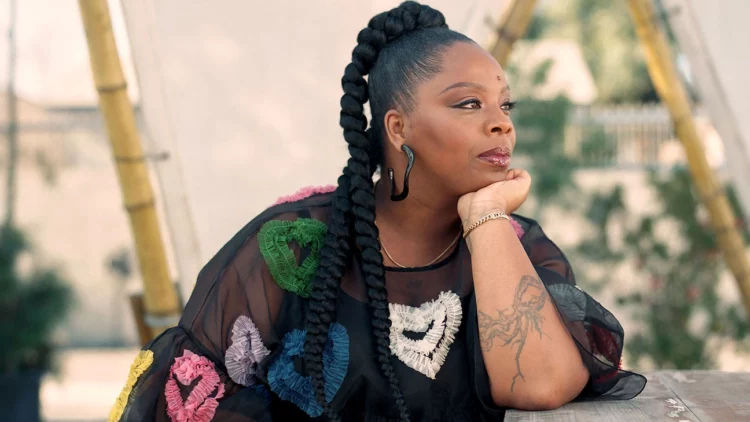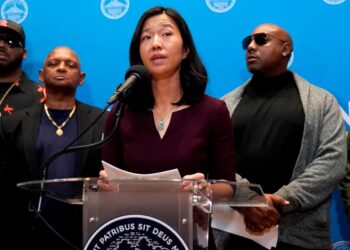New York Magazine’s Sean Campbell revealed the $6 million home Black Lives Matter leaders Patrice Cullors, Alicia Garza, and Melina Abdullah purchased in Southern California. The three women have faced extensive criticism for allegedly buying the property with donation funds while attempting to hide the transaction.
Campbell’s investigative reporting led him to the million-dollar home after the women recorded and published a now-deleted YouTube video marking the first anniversary of George Floyd’s death and the difficulties they faced over the past year while running the organization.
“For me, the hardest moments have been the right-wing-media machine just leveraging literally all its weight against me, against our movement, against BLM the organization,” Cullors said. “I’m some weeks out now from a lot of the noise, so I have more perspective, right? While I was in it, I was in survival mode.” Her statement was about an April 2021 article published by the New York Post, revealing that Cullors had purchased four homes worth $3 million.
During the conversation, Cullors leaned on her peers for support as Abdullah interjected, “I think they’ve attempted to cancel us, but they have not been successful in canceling us,” Abdullah said at another point in the conversation. “They’ve attempted to say — and I’m just gonna say it — ‘She bought some d**n houses. We gonna cancel her.’” Garza cut in with a comment seemingly addressed to critics: “Y’all don’t know shit about what it takes to live in a box here.” Surprisingly, Cullors stepped down as executive director of Black Lives Matter Global Network Foundation on May 27, News Onyx reported.
According to the report, the California home was purchased for nearly $6 million in cash in October 2020, using the money donated to the Black Lives Matter Global Network Foundation. The real-estate listing described the home as a 6,500 square foot mansion with half a dozen bedrooms and bathrooms, several fireplaces, a soundstage, a pool and bungalow, and parking for more than 20 cars. In October 2020, the foundation received $66.2 million from its fiscal sponsor. Two weeks later, a man named Dyane Pascall purchased the seven-bedroom home the leaders often referred to as the Campus. Board member Shalomyah Bowers said in an emailed statement on April 1 that the property was being used “with the intention for it to serve as housing and studio space for recipients of the Black Joy Creators Fellowship.”
The report confirmed that Pascall is the financial manager for Janaya and Patrisse Consulting, an LLC run by Cullors and her spouse, Janaya Khan. Within a week, Pascall transferred ownership of the house to an LLC established in Delaware by the law firm Perkins Coie. The Washington Examiner reported that the LLC was named after the property’s address.
Bowers told the outlet that the people selected for the fellowship would utilize the space for studio and housing needs. In addition, she claimed the organization would provide “recording resources and dedicated space for Black creatives to launch content online and in real life focused on abolition, healing justice, urban agriculture and food justice, pop culture, activism, and politics.”
Cullors used the property several times to create content for her YouTube channel. The leaders have also spent the night in the mansion after feeling unsafe in their own homes. She stepped down as executive director of Black Lives Matter Global Network Foundation on May 27, News Onyx reported.
Before her resignation, Cullors created two other groups within the organization, the Black Lives Matter Political Action Committee to engage in politics and BLM Grassroots to manage the organization’s chapters. However, in December 2020, 10 local chapters known as the BLM10 penned an open letter, claiming that Cullors became executive director “against the will of most chapters and without their knowledge.” They also claimed that chapter organizers had been prevented from informing the direction of the group and that most chapters had received “little to no financial support from BLMGN since the launch in 2013.”
While purchasing multiple homes, acquiring book deals, and teaching at Prescott College, Cullors said her main goal was obtaining homeownership, which Black Americans have struggled to achieve in this country, The Los Angeles Times reported.
“One of the biggest dreams for Black folks is land and homeownership,” Cullors said. “I knew that in order to have a certain level of stability, I wanted to own a home, and I also wanted people in my life to have access to homeownership. It means that I’ve co-financed homes, and I’ve supported folks to be on the path of homeownership. This isn’t new. Black women are often the primary breadwinners and supporters of our family members and community members.”
Several conservative groups, including the National Legal and Policy Center, started investigating Cullors by looking into her finances. Since this information is available through public records, the group shared their findings with right-wing media outlets to further uncover the former Black Lives Matter leader’s financial spending.
Families who have lost loved ones to police brutality have also turned their backs on Cullors. Samaria Rice and Lisa Simpson, both mothers whose sons were killed by police, called on Cullors, the organization, and other activists who were closely aligned with the organization, to “step down, stand back, and stop monopolizing and capitalizing our fight.”
In April 2021, Simpson held a press conference outside of Cullors’ South L.A. home as she continued to grieve the loss of her 18-year-old son Richard Risher who was killed by Los Angeles police in 2016.
“Black lives don’t matter. Your pockets matter,” she declared.
“Y’all come into our lives and act like y’all got our back, and y’all want to say ‘Black Lives Matter,’” Simpson continued. “But after we bury our children, we don’t see B, L or M, but y’all out here buying properties.”
While Cullors faced criticism from both sides, she told the news outlet that people would never understand the role of a Black woman in leadership.
“Nobody really understands the role of a movement leader, especially when it’s a Black woman or women in leadership — the level of vitriol we receive, the level of criticism, the level of expectation that we are supposed to be the mother for everybody. And that’s from Black folks and non-Black people, this idea that we have to give and give and give and give until we can no longer give.”















